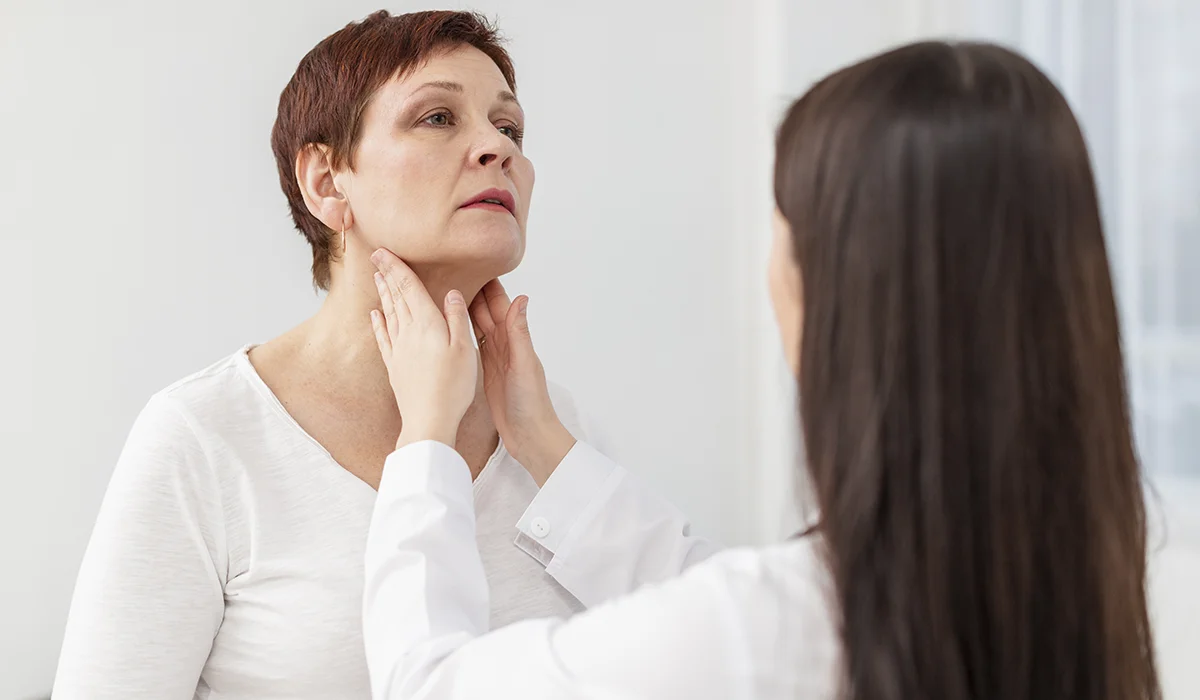Women face a startling reality: they’re up to eight times more likely to develop thyroid disorders than men throughout their lives. Additionally, many women also struggle with polycystic ovary syndrome (PCOS), another common hormonal imbalance. This dramatic difference raises questions about why women’s bodies are so much more vulnerable to thyroid conditions and PCOS.
The science reveals a fascinating web of biological factors specific to women’s bodies. Our immune system’s unique characteristics combine with constant hormonal changes that make us more prone to thyroid problems and PCOS. X chromosomes play a crucial role, along with pregnancy-related hormones and various environmental triggers that affect thyroid function and ovarian health. These connections help explain the rising cases of thyroid disorders and PCOS in women and point to ways we can better protect our overall hormonal health.
The Female Immune System and Hormonal Health Connection
The human immune system reveals fascinating patterns about why thyroid disorders and PCOS affect women more often than men. Research shows women face a risk seven to eighteen times higher than men when it comes to autoimmune thyroid disorders. Similarly, PCOS, while not typically classified as an autoimmune condition, also has a strong connection to immune function and inflammation.
Why autoimmune disorders target women more
The link between our immune system and hormonal health tells an interesting story. More than 80% of patients who have thyroid dysfunction show signs of autoimmune activity. This autoimmune response guides patients toward conditions like Hashimoto’s disease, which women experience 4 to 10 times more often than men. While PCOS is not considered an autoimmune disorder, it shares some similarities in terms of chronic inflammation and hormonal imbalance.
The role of X chromosomes in immunity
X chromosomes play a vital part in this story. Many genes that regulate immune function live on the X chromosome, so this affects how our bodies respond to threats. These X-linked genes handle:
- Immune system regulation (including FOXP3 and CD40L)
- Interleukin receptor production
- Overall immune response coordination
This genetic makeup not only influences thyroid health but may also play a role in the development of PCOS and other hormonal imbalances.
Genetic factors increasing susceptibility
Genetics shape much of our risk for thyroid disorders and PCOS. Twin studies show that genetic factors determine 70-80% of our susceptibility to autoimmune thyroid diseases. Your risk goes up if your family members have thyroid conditions. Scientists found that genes control about 64% of thyroid-stimulating hormone levels and 65% of thyroid hormone concentrations.
Similarly, PCOS also has a strong genetic component. The question “Is PCOS genetic?” often arises, and research suggests that it is indeed hereditary to some extent. People with a first-degree relative who has Hashimoto’s disease or PCOS are more likely to develop these conditions. Notwithstanding that genetics play the most important role, environmental factors also influence how thyroid disorders and PCOS develop.
How Female Hormones Affect Thyroid Function and Ovarian Health
The complex relationship between female hormones, thyroid function, and ovarian health explains why women experience thyroid disorders and PCOS more often. Let’s look at how hormonal changes affect thyroid and ovarian health during different life stages.
Estrogen’s effect on thyroid hormone production and PCOS
Estrogen levels substantially influence thyroid function and ovarian health in several ways. Higher estrogen leads our bodies to produce more thyroid binding globulin (TBG), which reduces the amount of free thyroid hormone available for use. Studies also show that estrogen increases thyroglobulin gene expression, which affects how our thyroid produces and stores hormones.
In PCOS, there’s often an imbalance between estrogen and androgens (male hormones). High testosterone in women is a common feature of PCOS, contributing to symptoms like acne and hirsutism (excess hair growth).
Progesterone fluctuations and hormonal balance
The relationship between progesterone and thyroid creates a fascinating balancing act. Research shows that proper progesterone levels can increase free thyroid hormone (T4) levels. It also helps decrease TBG production, unlike estrogen’s effects, which makes more thyroid hormones available for our bodies to use. This balance becomes vital as we age because hormonal changes can affect our thyroid function and ovarian health.
In PCOS, progesterone levels are often low, which can contribute to irregular periods and anovulation (lack of ovulation).
The pregnancy hormone connection
Pregnancy creates dramatic changes in thyroid function and can also affect PCOS symptoms. Here’s what happens to our hormones during pregnancy:
- Our thyroid hormones pass directly to our developing baby
- Human chorionic gonadotropin (hCG) and estrogen cause higher thyroid hormone levels
- We need 25-50% more thyroid hormone during pregnancy
For women with PCOS, pregnancy can sometimes temporarily improve symptoms due to hormonal changes. However, PCOS can also increase the risk of certain pregnancy complications, making careful monitoring essential.
These changes show why many women need careful monitoring of their thyroid function and overall hormonal health during pregnancy. Many women also experience postpartum thyroiditis after giving birth, which can cause either over- or under-active thyroid conditions.
Understanding Different Types of Thyroid Disorders and PCOS
Women face several common types of hormonal disorders, including thyroid conditions and PCOS. Learning about these conditions helps us spot symptoms early and get the right treatment.
Hashimoto’s thyroiditis in women
Hashimoto’s disease is our most common thyroid problem. It shows up 4 to 10 times more frequently in women than men. Most women develop it between ages 30 to 50, but it can start at any age. Our immune system attacks our thyroid cells, which leads to:
- Persistent fatigue and muscle weakness
- Unexplained weight gain
- Depression and memory issues
- Irregular menstrual cycles
Graves’ disease prevalence
Graves’ disease hits women five times more often than men. Most cases appear between ages 30 and 60. This is a big deal as it means that women are seven times more likely to develop Graves’ disease in the year after giving birth.
PCOS explained
PCOS (polycystic ovary syndrome) is another common hormonal disorder affecting women of reproductive age. PCOS symptoms can include:
- Irregular periods or anovulation
- High androgen levels leading to acne and hirsutism
- Polycystic ovaries visible on ultrasound
- Insulin resistance and potential weight gain
PCOS treatment often involves lifestyle changes, medications like metformin to address insulin resistance, and sometimes birth control pills to regulate menstrual cycles.
Postpartum thyroiditis explained
Postpartum thyroiditis needs special attention because it affects 5-10% of women in their first year after childbirth. The condition moves through specific phases:
- An overactive thyroid phase comes first
- Then an underactive thyroid phase follows
- The thyroid function returns to normal
Most women recover, but 20-30% of us develop lasting thyroid problems. Women need careful monitoring, especially when they have previous thyroid issues, PCOS, or type 1 diabetes.
The Role of Environmental Factors
Environmental factors are vital to thyroid health and PCOS management and tend to affect women more than men. We face greater exposure to substances that can disrupt our endocrine system.
Effect of endocrine disruptors
Daily life exposes us to many endocrine-disrupting chemicals (EDCs) that can alter thyroid function and contribute to PCOS. These substances enter our bodies through:
- Personal care products and cosmetics
- Food packaging materials
- Household cleaning products
- Pesticides on produce
- Contaminated drinking water
Research shows that specific EDCs can decrease thyroid hormone production and interfere with ovarian function. These chemicals affect women differently because of their unique hormonal makeup and higher percentage of body fat where such substances accumulate.
Stress and hormonal function
Chronic stress affects our thyroid function and can exacerbate PCOS symptoms in several ways. Our bodies release cortisol during prolonged stress, which can:
- Slow down thyroid hormone production
- Reduce the conversion of T4 to active T3
- Increase thyroid hormone resistance
- Suppress TSH levels in the blood
- Contribute to insulin resistance, a key factor in PCOS
Studies show that stress-related disorders are vital to developing autoimmune conditions and hormonal imbalances. About 90% of human diseases link to stress activation.
Nutritional deficiencies common in women
Research shows that specific nutrient deficiencies can alter our thyroid health and contribute to PCOS symptoms. The key nutrients for hormonal health include:
- Selenium – Studies show that 200 mcg daily supplements may help decrease thyroid antibodies
- Vitamin D – Women with thyroid disorders and PCOS often show vitamin D deficiency compared to others
- Iron – Women with thyroid conditions or PCOS often have low iron levels or iron deficiency anemia
- Zinc – Essential for thyroid hormone production and may help with PCOS symptoms
- Iodine – Needed to synthesize thyroid hormones
A nutrient-dense diet rich in whole foods supports optimal thyroid function and can help manage PCOS symptoms for most people. Pregnant women or those with existing thyroid conditions or PCOS might need extra supplements to maintain hormonal health.
Conclusion
Knowledge about our higher risk of thyroid disorders and PCOS enables us to take better care of our health. Our unique biology makes us more vulnerable to these conditions, especially when you consider immune system and hormonal changes. Our thyroid function and ovarian health depend on genetic factors, environmental influences, and nutritional status.
This knowledge about increased risk can motivate us to protect our hormonal health instead of seeing it as a disadvantage. We should watch for early warning signs and seek medical help quickly, especially during pregnancy and after childbirth. Our thyroid function and overall hormonal balance work better when we make smart choices about our environment and nutrition.
These thyroid disorders and PCOS affect many women, which means we’re not alone in this experience. We can manage these conditions well and stay healthy with proper medical care, lifestyle changes, and by listening to our body’s signals. Whether dealing with thyroid issues, PCOS, or both, understanding our bodies and seeking appropriate care is key to maintaining our health and well-being.





